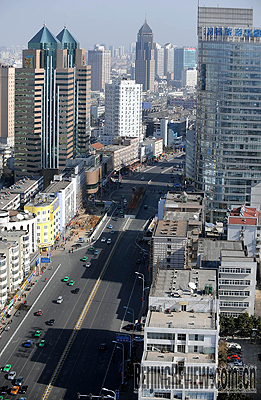|
 |
SPENDING SPREE: China forges ahead in 2008 with an infrastructure construction boom in both urban and rural areas to pump steam into the slackening economy. The photo shows the thriving city of Hefei, capital of central Anhui Province |
In the wake of the bumpy ride in 2008, where will the Chinese economy go in the midst of the global financial turmoil, and how will it fend off the devastating effects of an international economic recession? Beijing Review interviewed 10 economists and experts to get their insights about China's economic prospects this year.
David Dollar: The first part of 2009 looks particularly difficult

The impact of the global financial crisis will be more severe in 2009 than in 2008. For the first three quarters of 2008 China's economy and exports grew well. It is only in the fourth quarter that the global downturn really affected China. Those effects will probably get stronger over the next six months.
Right now the property sector and the export sector are the main ones having difficulty. In November, China's exports were affected by the slowdown in global demand and by problems in the financial system, limiting trade credit. The problem with trade credit will probably get resolved in the next few months, though global demand will remain poor.
The World Bank forecasts a small increase in China's exports in 2009. So, 2009 should be a little bit better than the November export performance. But the slowdown that started in property and exports will spread to other sectors of the economy. In particular, productive investment across the board will slow.
We support China's big stimulus package. China has the fiscal room to expand spending and cut taxes, which should be an effective stimulus. It may take a few months for the package to have a big effect, and that is why the first part of 2009 looks particularly difficult. But the infrastructure projects in the package will stimulate demand for steel, cement and construction. That in turn should have a positive spillover effect on the rest of the economy. So for all of 2009 we are forecasting 7.5-percent GDP growth for China, which would be a good performance in the midst of the global slowdown.
I would make sure that the fiscal package includes money for unemployment compensation for laid-off workers and raises the minimum income support for the poor. These measures help the most vulnerable and are also effective stimulus measures. Infrastructure projects will take time to start and will not help the labor-intensive exporting firms. In this global environment it is inevitable that many exporting factories will close. Making sure that the workers have adequate income during the downturn is key.
(David Dollar is the World Bank's Country Director for China and Mongolia.)
Tao Dong: The global economy will follow a "007" pattern in 2009

In 2009, the world economy might follow a "007" pattern: zero-percent world financial growth, a zero-percent interest rate worldwide, and 7-percent GDP growth for China.
Credit Suisse First Boston forecasts the world economy will grow a mild 1.3 percent, falling into a recession. Central banks around the world, including that of China, will move toward a zero-percent interest rate to fend off an economic slowdown.
If China's property market continues to fall along with the economic slowdown, the government might introduce another round of interest rate cuts on a large scale in the first half of 2009. In the summer, the one-year deposit interest rate might drop to as low as 1 percent from its current 2.25 percent.
In 2009, it is possible that the renminbi could depreciate, but it will appreciate in the long run, because the current Chinese export conundrum has resulted from bleak international demand and is not a matter of weakening competitiveness. The renminbi exchange rate with the U.S. dollar will depreciate at most to 7.1 to 1, or 7 to 1.
The double-digit growth of the past five years was based on two major factors: China joined the World Trade Organization in line with globalization, which boosted the country's exports; and urbanization and the property market boom directly led to explosive growth in over 50 relevant industries.
After the outbreak of this round of financial crisis and before any new major factor emerges, China's GDP can only grow by 8 or 9 percent in the following years.
Comparatively speaking, the Central Government will become the major investment power in 2009 by pouring money into a variety of costly projects like the west-to-east gas transfer, express railways, large-scale power grids and communication networks.
But the government's stimulus initiative won't spur much private investment. GDP growth can only be maintained at 8 percent at most in 2009. The Chinese economy won't grow as buoyantly as it did in the past five years, and it may take three years before the economy takes off again.
However, the global economic downturn also brings new opportunities for China, as it will enter a new consumption era, because the income of 20-somethings is growing fast. They are willing to buy, dare to live on credit, and endlessly pursue luxury goods. Their consumption habits will have a wild impact on the global consumption pattern. We estimate that China's private consumption will account for 21 percent of world consumption by 2020.
| 